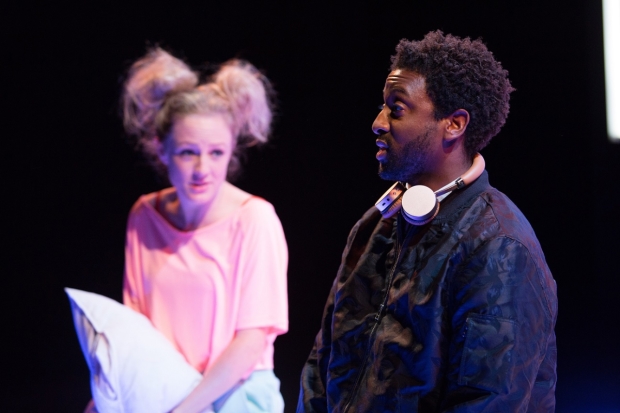Review: The Magic Flute (Soho Theatre and tour)
OperaUpClose presents an entertaining new take on Mozart’s Singspiel

© Christopher Tribble
After winning the Olivier Award for La bohème OperaUpClose had a bumpy ride, with a threadbare quality to subsequent shows during the company’s King’s Head residency. Nowadays, though, under the shrewd artistic direction of Robin Norton-Hale, OUC has found its niche at venues like the Soho Theatre and is producing consistently interesting work. La traviata was ambitious, Carmen was imaginative, and this bold realisation of The Magic Flute tops the lot.
It is billed as a ‘new English version’ by Glyn Maxwell, but he’s being too modest. No, this is a wholesale reinvention, borderline outrageous yet never crossing the line into artistic insolence, and it has a genuinely good chance of achieving that elusive Grail of creating new audiences for opera. With only six singers to work with, the librettist of Nothing and The Firework Maker’s Daughter had no choice but to de- and re-construct Mozart’s Singspiel, but his theatrical flair has allowed him to make a virtue of necessity. The result is clever and satisying.
Pamina and Tamino are a young couple whose dreams are at odds with their waking personas. We first encounter them in bed, that eternal battleground of the sexes, and they drift between states of sleep and wakefulness as the opera unfolds. In their double lives, the corporeal and the interior, they are "straining for enlightenment" as Maxwell puts it.
'Punchy and gag-strewn'
If that sounds a long way from Mozart and Schikaneder, strangely it isn’t. Musically the story is told in moods and meaning that faithfully reflect those of the original, and it’s still about two lovers finding each other. Familiar characters haunt their dreams: Papageno is a lovelorn lad with a selfie fixation (his rising ‘pipe’ motif is a ringtone, naturally), Sarastro is a flamboyant nighthawk and the Queen of the Night is the name of a dodgy nightclub as well as a coloratura soprano. It all makes sense while you watch it and I was transfixed.
I also laughed a lot. Glyn Maxwell’s text is punchy and gag-strewn, and the cast I saw delivered it with zest. (There are two alternating companies to allow for unbroken theatrical runs.) Baritone Peter Brathwaite seems to get the lion’s share of the laughs as Papageno, although his extensive stage experience may have skewed that in his favour. What a prodigious talent he is.
Susie Buckle sang sweetly as a pouty Pamina, Lawrence Olsworth-Peter was a touchingly confused Tamino and bass Lancelot Nomura a silken Sarastro. Rosie Middleton added a splash of fun as Papagena and the always excellent Fleur de Bray was in ravishing voice as she nailed the Queen of the Night’s two arias. As for the rest of Mozart's extensive dramatis personae: doubling, my dear, doubling.
OUC stalwart Alex Beetschen has supplied a cunning reduction of Mozart’s score for four musicians on a range of instruments. There’s a touch of the twang in his guitar writing that persuaded me the show might work even better with musical theatre voices, or perhaps as a hybrid; but as currently cast it still makes for a satisfying night.
Valentina Ceschi‘s direction is efficient if not especially stylish, but she makes good use of Emma Bailey‘s tiny spinning set and Zoe Spurr‘s outstanding lighting designs. It’s a Magic Flute that will tour well and spread more than a little happiness as it goes. Don’t hesitate.
The Magic Flute runs at the Soho Theatre until 7 October, then tours extensively.












